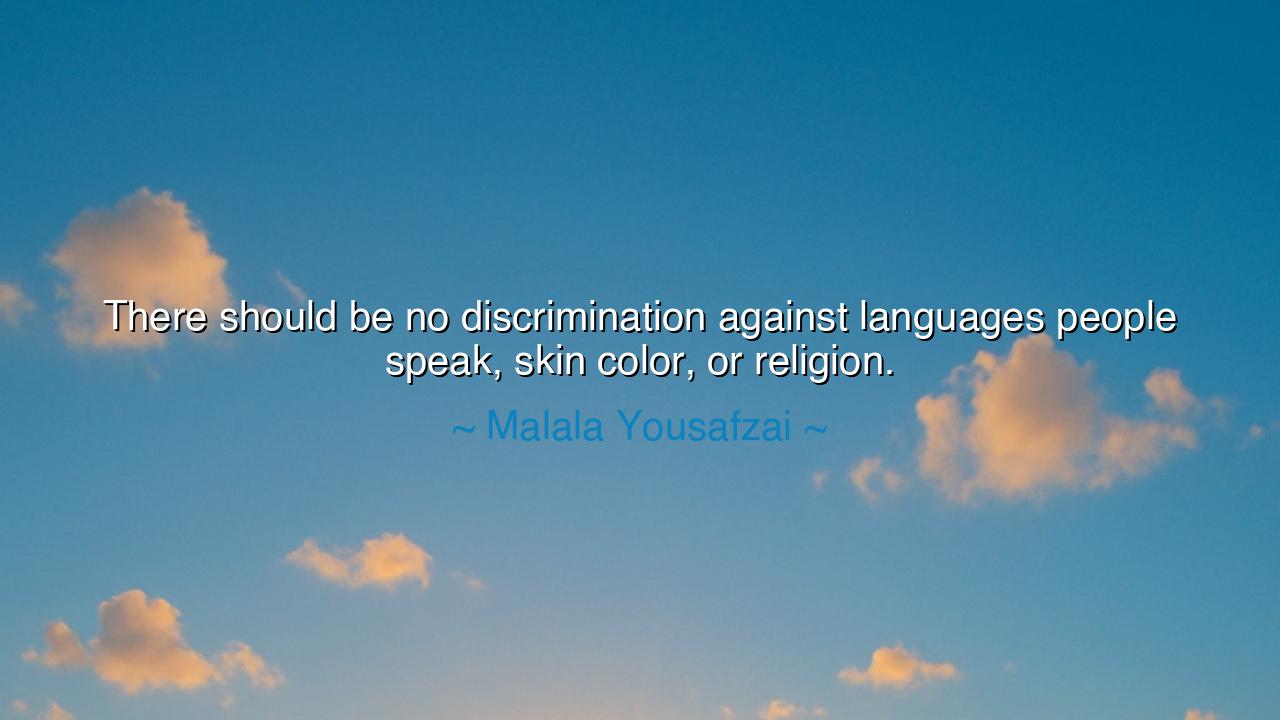
There should be no discrimination against languages people speak
There should be no discrimination against languages people speak, skin color, or religion.






The words of Malala Yousafzai—“There should be no discrimination against languages people speak, skin color, or religion.”—shine like a clear flame against the darkness of ignorance and division. In her voice, the cry of justice becomes simple, pure, and undeniable. She reminds us that the marks of identity—language, color, and faith—are not chains that bind us apart, but colors in the tapestry of humankind. In her wisdom, born not of ease but of struggle, she speaks of a truth both ancient and eternal: that human dignity knows no tongue, no hue, no creed.
The origin of this quote is found in Malala’s advocacy for equality and education, spoken and written as part of her mission to bring light where oppression reigns. Born in the Swat Valley of Pakistan, she grew up under the shadow of those who sought to silence the voices of women and the powerless. At fifteen, when she was struck down by violence for daring to speak of girls’ right to learn, her courage only grew. In her speeches before the United Nations, in her interviews, and in her book I Am Malala, these words became her creed—a call to recognize that discrimination against any group for the way they speak, look, or believe is not only unjust but inhuman. For her, these differences were not divisions; they were the essence of human beauty.
To speak of no discrimination is not to speak of sameness, but of respect. Malala’s words mirror the wisdom of the ancients, who taught that the soul has no color and the truth no single tongue. The language a person speaks is the music of their homeland; the shade of their skin is the poem of their ancestors; their faith is the light by which they walk through the darkness. To scorn these things is to scorn the Creator’s own art. Malala’s teaching reminds us that the world’s greatness lies not in its uniformity but in its diversity, and that only when we honor difference can we call ourselves free.
History itself proves her truth. Consider Nelson Mandela, who stood for decades against the cruelty of apartheid in South Africa. He was imprisoned for twenty-seven years, yet when he emerged, he did not call for vengeance, but for unity. He understood, as Malala does, that the liberation of one race or faith means nothing if others remain in chains. When Mandela became president, he did not erase difference; he elevated it. He called his people not to forget their colors, but to let them shine together in the light of reconciliation. From such leaders, we learn that equality is not a dream of sameness, but a balance of dignity, where each person may stand tall in their own identity.
Malala’s words also strike at the heart of our modern world—a world still divided by prejudice, still deafened by fear. We see discrimination not only in the streets but in the quiet corners of speech, in the subtle cruelty of exclusion. The languages of the poor are mocked as lesser; the skin of the stranger becomes a target; the faith of another is treated as threat. Malala calls us to unlearn this blindness. She reminds us that discrimination is not born of difference, but of ignorance, and that to end it, we must first open our eyes—to see in every face not the stranger, but the reflection of ourselves.
There is deep moral courage in her vision. She does not merely ask for tolerance—that weak and fragile peace of coexisting without understanding. She calls for something higher: acceptance, the recognition that every human being, whatever their tongue or color or belief, carries within them the same fire of spirit. Her plea is not only for governments or laws, but for hearts—to build not just schools and rights, but empathy, for only empathy can end the wars that begin in the mind.
So, my child, let these words dwell in your soul: judge no one by what they seem, but by what they are. Speak kindly to those whose accents differ from yours; honor the shades of humanity as you would the shades of dawn; listen to faiths not your own, and you will find the same truth beating in them all. For as Malala teaches, to discriminate is to divide the human family, but to love across difference is to restore its unity. The peace of the world begins in the heart that refuses to hate.
Thus, the words of Malala Yousafzai become not only a declaration, but a sacred commandment for our age: “There should be no discrimination against languages people speak, skin color, or religion.” Follow this law, and you become a guardian of light in a darkened world. For when all tongues are heard, all colors cherished, and all faiths honored, humanity will finally remember what it was always meant to be—one people beneath many skies, bound not by sameness, but by love.






AAdministratorAdministrator
Welcome, honored guests. Please leave a comment, we will respond soon